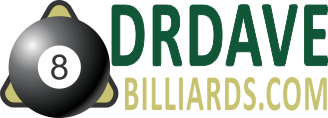In terms of working on changes, one thing is best, two is probably OK and three is an absolute maximum that's workable in certain situations.
Especially for fundamentals, if there are one or two major things, like stance and grip hand position, the minor things may take care of themselves as those major things are incorporated.
good timing for me to have a little insight on this, student's perspective/follow up:
while I'd considered this thread weeks ago, I wasn't able to get on a table until yesterday
due to personal conflicts, my buddy and I hadn't been able to play our weekly game
but I've had pool stuff stewing around in my head, including the vision stuff
my goal was to play the whole session ob last with the eyes..never done it before
a wrinkle is that I also decided I would change my grip to incorporate my whole hand
usually, I mostly grip with my thumb, index and middle finger, loosely
but it occurred to me recently that I could maybe straighten out my kinetic chain by adding fingers
my elbow occasionally flares out sometimes when I stroke, maybe incidentally, not sure
my thought was that if I got more fingers on the cue, that would straighten out my wrist, and so on
just an idea- maybe that's a thread in itself, but anyway, I thought I'd try it
I also tried to keep my back foot more consistently perpendicular than I usually do
so, a few things at once. the back foot thing wasn't a big change tho, since I've been doing it
before playing, it did seem like a lot to do, but it actually wasn't too bad
if it had felt like too much, I would have been glad to slow down
my eye "pattern" was:
sight the shot while up, then down, confirm aim, pause at the cb, then move my eyes to the ob, shoot
and it seemed to work well enough. there were a few moments where my timing felt off
but overall, it felt ok. and I feel good that I could trust my stroke enough to look away from the cb
one thing I realize in retrospect was difficult for me shooting ob last, is long shots
I missed a few, and feelings of being "off" were magnified shooting from distance
but I can work on that. it kind of makes sense to me that those shots would be difficult.
stroke-wise (grip hand), it felt ok, too- still had the loose grip, just more coverage from the fingers
and did my alignment change? I don't know. will have to review the video
even tho we played a few hours, I couldn't really tell that I was shooting more/less straight
I'll have to try this stuff out by myself on some exercise shots to see more detail
conclusions:
I can shoot ob last. is it the way to go? not sure- but I'm going to pursue it, if only to get the experience
even tho I changed a few things in my game, I still played well overall. would say a handful more misses
and I had some nice runs, too. think this gives credence to letting the subconscious do some of the work
otherwise, I'm glad to be on a track that I think will teach me more about the game and my place in it
thanks again all-
